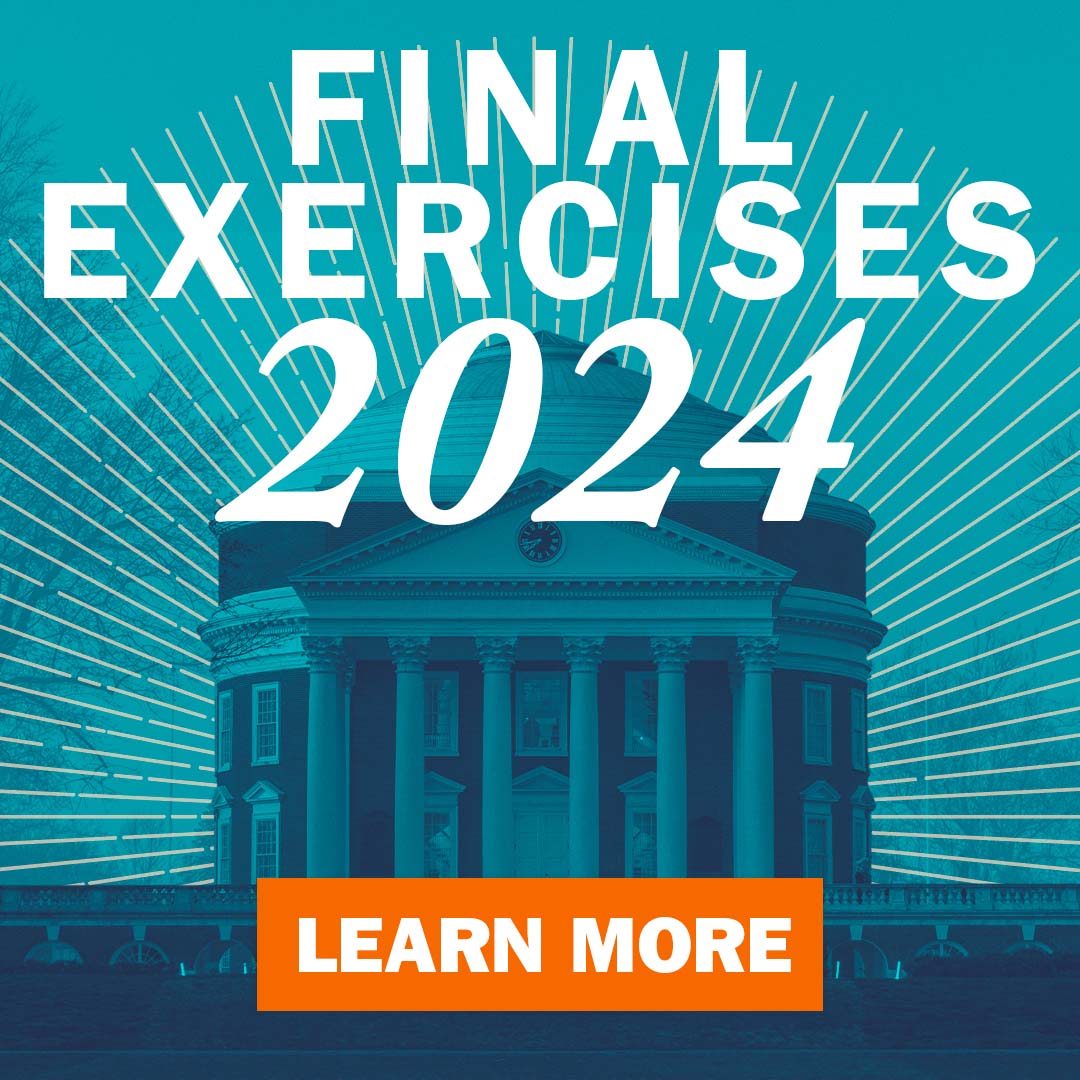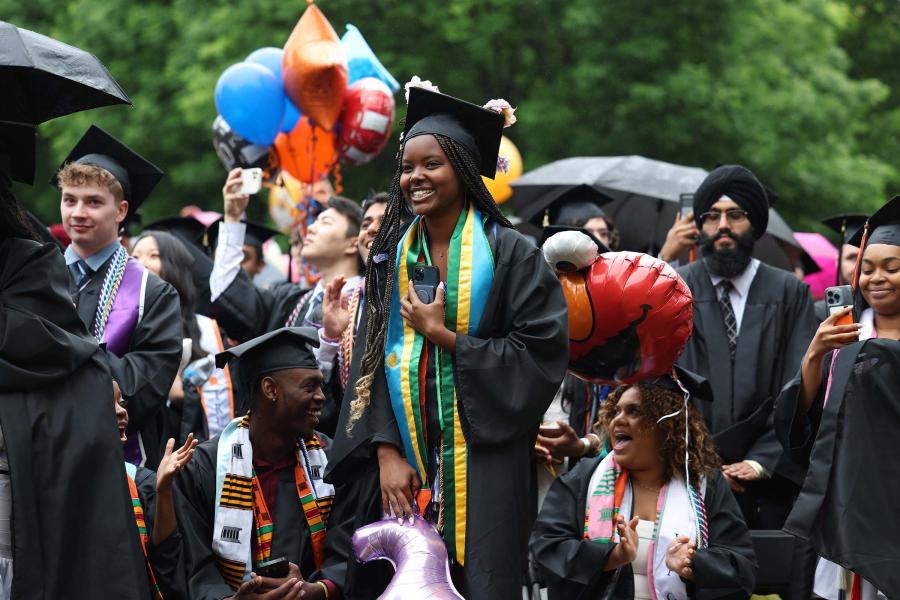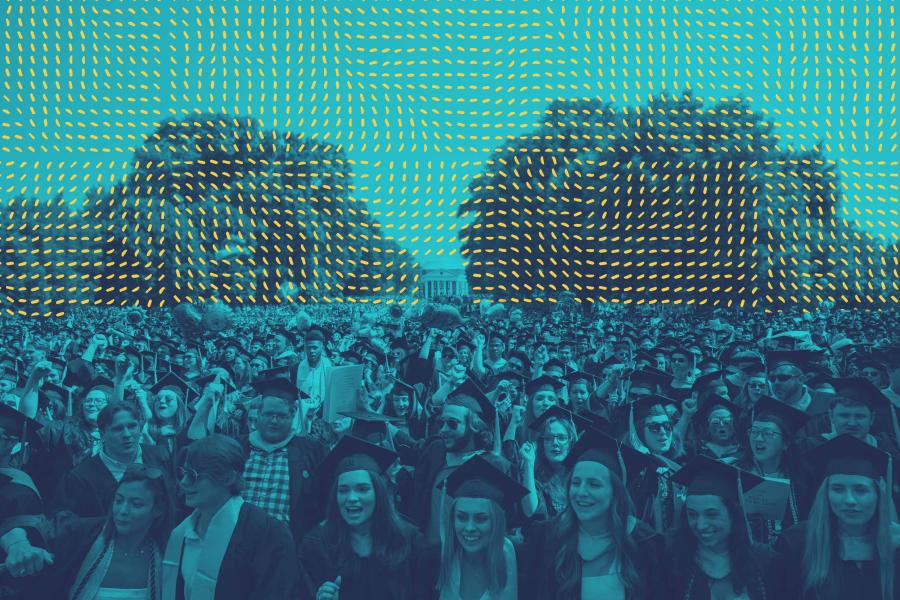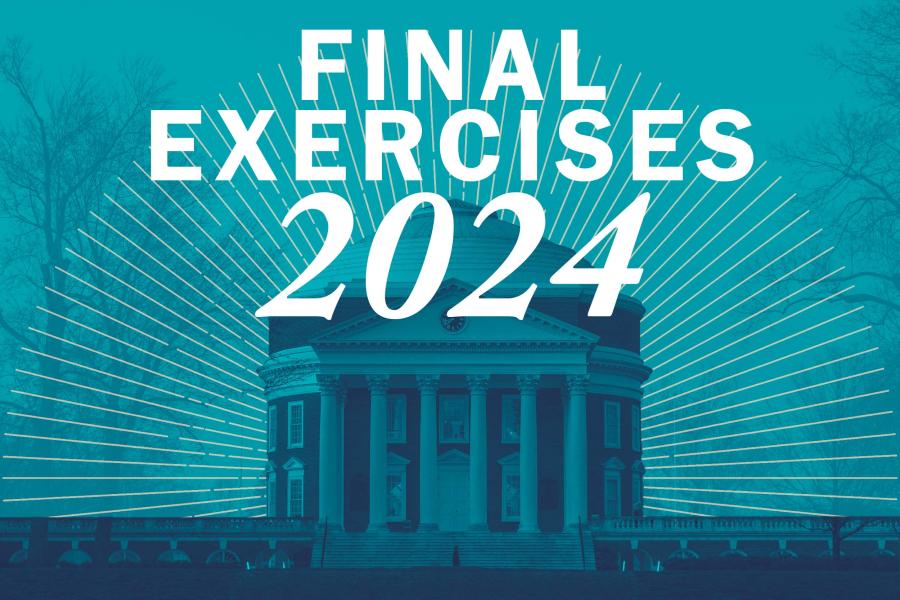The text of psychology professor Daniel Willingham’s address to the University of Virginia’s Class of 2024, delivered May 18 on the Lawn:
Psychology Professor Daniel Willingham’s Saturday Speech to the Graduates
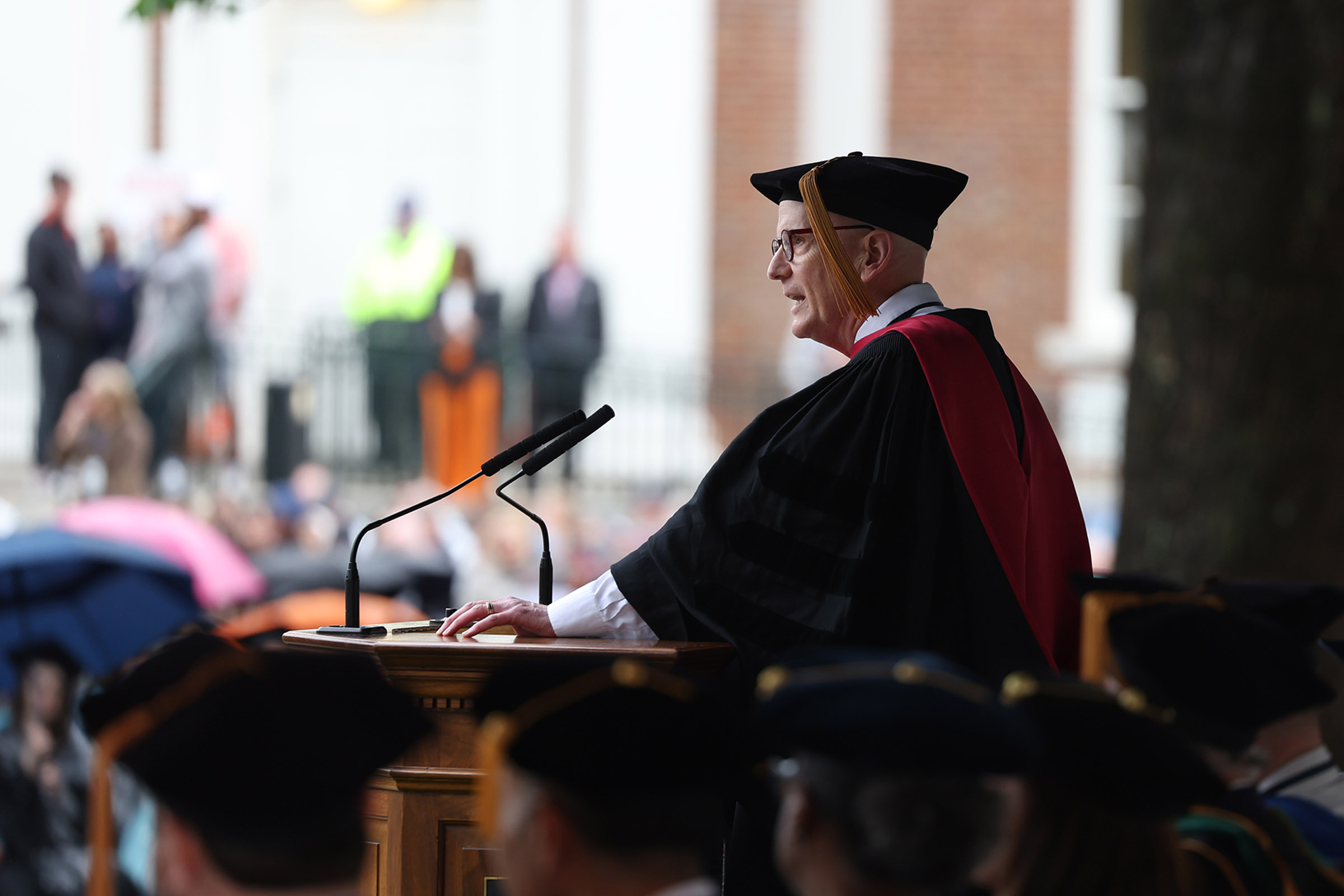
UVA psychology professor Daniel Willingham delivers the keynote speech to graduating students on Saturday. (Photo by Matt Riley, University Communications)
Thank you, Rector Hardie, and good morning to all.
Graduates, I’ve devoted my professional life to studying how people learn, so I’d like to share some thoughts on how to keep learning after you leave the University of Virginia.
I expect your reaction to that is, “Right, Lifelong learning, How nice. Listen, I don’t need to be inspired about that. I’m already in favor of lifelong learning.”
I understand that reaction. For everybody graduating today, learning is kind of your thing. You’re really good at it.
But hear me out, because although you don’t need inspiration for lifelong learning, I think you might need guidance. I predict that, say, 10 years from now, you won’t feel like a lifelong learner. If you’re like most college graduates, 10 years from now you’ll be thinking, “What happened to me? I used to be kind of intellectual, like I was interested in stuff. Now, anything new I learn, it’s for my job.”
Here’s why I make this gloomy prediction: What learning means to you has been shaped by the way learning works at school. At school, you learn stuff that other people have decided, “This is what’s important to know.” You pay attention to it even if you don’t find it interesting, and you continue to pay attention to it until you have not just understood it, but have committed it to memory.
That approach to learning makes sense for what you need to learn during your school years. But after graduation, you shouldn’t think that learning always means mastery, and that learning always happens in a class. But because that’s the way it’s been most of your life, that view of learning is kind of hard to shake.
So, 10 years from now, you might think, “I’ve always wished I could speak Italian.” So what are you going to do? You’re going to treat it like a class. You’re going to download DuoLingo, and plan to study every day so you can master the language. But you’re going to be busy; it’ll be hard to keep that up. Every time you open your phone, there’s that damn owl smiling at you. So eventually you’re going to delete the app.
Or 10 years from now, you’ll join a book club because you’ll figure, “That will force me to read the books everybody’s talking about, like that new biography of Sen. Miley Cyrus.” But the club will make you feel like you’re right back in class at UVA, because once again you’ll be sitting with a group of people you don’t know very well, trying to think of something to say that sounds smart – and that won’t reveal that you haven’t done the reading.
The problem is that many of you are going to be in demanding jobs, many of you will have families, and learning the way you learn in school is also demanding. Something’s got to give, and it’s not going to be your job, and it’s not going to be your family.
To be successful in school, you had to trick your brain into learning in a way it didn’t evolve to learn. That’s why it felt so hard. As you move into this next phase of your life, I urge you to adopt an approach to learning that is less effortful, because it is better tuned to the way the human mind naturally learns.
So what does that look like? A good guide is to observe children in preschool. Preschool teachers have to capitalize on this sort of natural learning, because kids that age don’t know how to do the unnatural kind of learning yet. There are four characteristics of learning in preschool that I think are a useful guide for you, for lifelong learning once you leave UVA.
First, preschoolers don’t study, or commit things to memory, but preschoolers enjoy new experiences. They enjoy exploration. A preschool teacher might keep a lizard in a terrarium, not because children are going to memorize the names of lizard body parts, but in the hopes that kids will find it interesting simply to watch it. And to ask questions.
The innate drive to explore is something we share with many other species. Animals that have regular territories where they forage or hunt will sometimes skip a territory that they know generally pays off in order to explore a new one. In lab experiments, humans do the same thing – they’ll skip a known reward in order to explore something new.
What’s the point of this innate curiosity? Well, that seems obvious: There’s an advantage to knowing the world around you. But there’s a little more to it, because curiosity is not simply collecting information about the environment. To give you a sense of this, play along with me for a moment.
What would be your first thought in the following situation? You wake up, go into the kitchen to see about breakfast, open the refrigerator door, and you find a bowling ball. First thought?
For most people, it’s some version of “Who did this?” Now note, if you were just a collector of information about your environment, you would take this new bit of information, and use it to derive more information about your environment. You would see that bowling ball and say to yourself, “I can use deductive logic to conclude that bowling ball is cold.” Or you could say, “I can use inductive logic to infer refrigerator shelves are strong enough to support the weight of a bowling ball.” But most people don’t do that; they want information about causality. Humans aren’t just collectors of facts about the environment; we want to understand our environment.
So the first preschool principle for lifelong learning is that you should replace your very definition of learning. Don’t think of learning as “memorizing or mastering”; think of learning as “exploring and understanding.”
Second principle: Preschoolers are curious, but their curiosity is very short-lived. And the same is true of adults. You’ve learned to maintain attention, even when you’re bored – again, a valuable skill for certain types of learning, but not the brain’s natural tendency.
Curiosity is the brain’s way of signaling to you, “There’s something cool out there! Pay attention! You’re going to learn something.” But your brain only cares if the cool thing is out there right now. In other words, your long-term interests don’t factor into the feeling of curiosity.
That’s why you might take a class on a subject you’re really interested in, and yet somehow, the professor makes the subject boring. You can tell your brain, “No, no, hang in there, this a cool subject. We like this”; your brain is still like, “I’m dying here.”
And then on the other hand, a friend might persuade you to watch a documentary on something you think you have no interest in at all – say, type fonts – and somehow you find yourself fascinated.
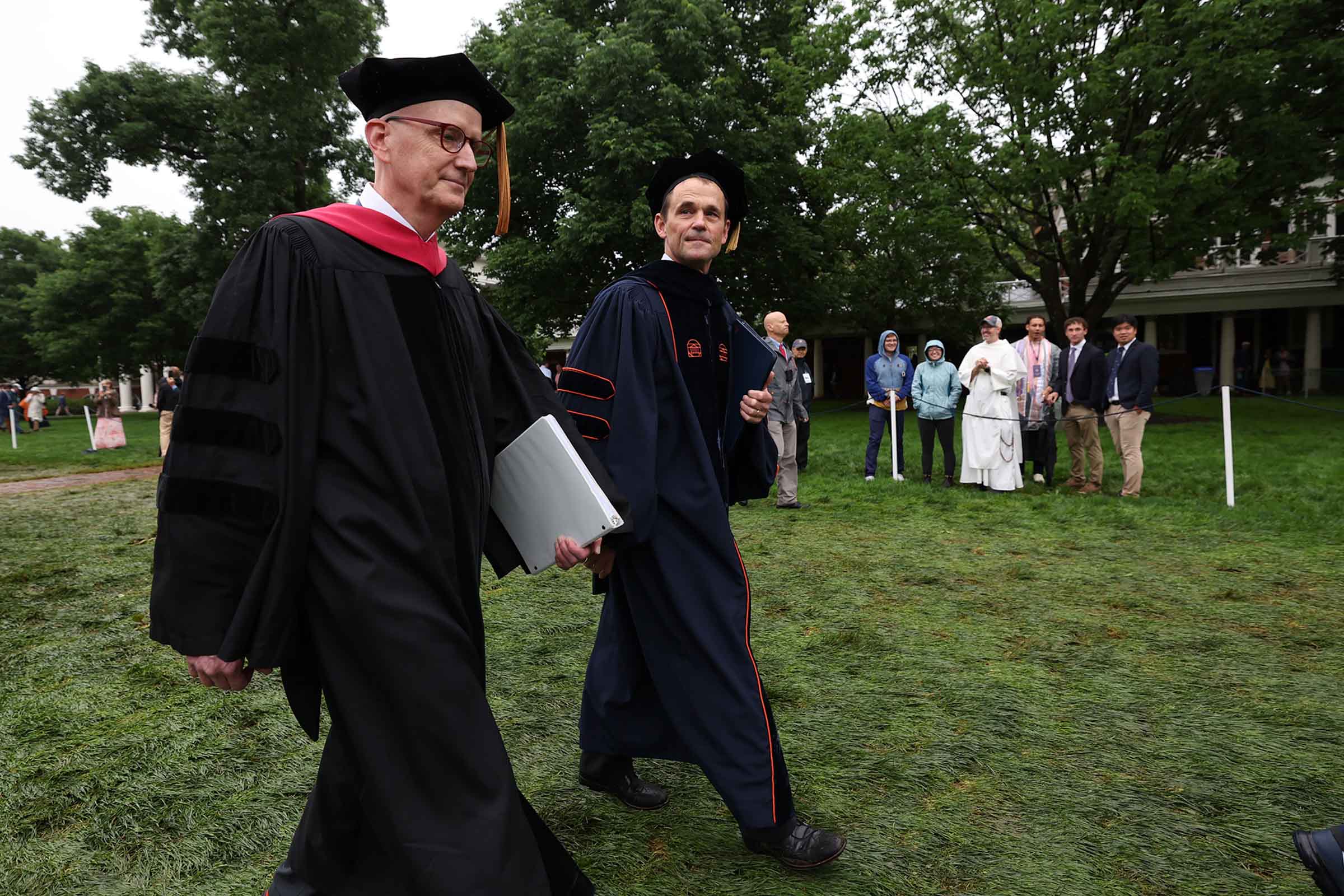
Willingham walks with UVA President Jim Ryan across the soggy Lawn toward the stage for Saturday’s Final Exercises. (Photo by Matt Riley, University Communications)
Almost all social media apps use the same strategy to deal with the tiny time window of curiosity. An algorithm selects what you see next. “Algorithm” is really just fancy word for, “You liked this before. Here’s some more of it, but we’ll make it just different enough so you watch to make sure “yup, that was what I liked before.”
So naturally, after an hour on TikTok, you don’t feel satisfied. Curiosity is meant to help you learn about and understand your environment, but the algorithm clickbaits your brain into seeing the same sort of thing over and over again.
Preschools don’t engage children by giving them the same stuff that they’ve liked in the past. Instead, a preschool classroom has several work centers, leaving children free to select what piques their curiosity. The teacher is happy for the child to select any of them, because they are all enriching.
This is a good strategy for you, as a lifelong learner. You need to ensure that your internet foraging grounds lead to learning that later feels like it actually paid off. So always have books on your phone, both Kindle and audiobooks. Bookmark websites like JSTOR Daily, or long reads in the New York Times. Put these apps front and center on your home screen and make TikTok and Instagram and the rest a little harder to access.
The second principle for lifelong learning, then, is to curate your environment the way a preschool teacher curates the environment of the classroom. Surround yourself with novel, enriching, easy-to-access information.
Third principle: Preschoolers are creatures of habit. Any parent will tell you that changing a child’s routine, even in what seems like a trivial way, is asking for trouble. I’m reminded of the time my oldest daughter, who was about 3 at the time, refused to take a bath because “that water is too wet.” (There was more water in the tub than there usually was.) Routines make for a predictable environment; that’s comforting for a child, and that’s one reason preschool classrooms lean heavily on routine.
Adults are fond of routines as well. Partly for comfort, but even more we feel that our routines make our busy lives more manageable. Most people, when they start their first job, fall into a weekly routine of when they do laundry, grocery shop, pay bills, and so on. There’s usually not much free time, so trying to shoehorn in a new activity – for example, practicing your Duolingo Italian each day – is likely to fail.
Here’s a better strategy: Don’t add learning activities; tweak old habits to make it more likely that you’ll experience and understand new things while you’re doing them. If you listen to a lot of music, try experimenting with some different genres. If you have lunch with a friend every other week, try a restaurant with a cuisine that neither of you know anything about. And wherever you find yourself, actually look around. I was at the University of Virginia for 10 years before I learned that, buried not 100 yards from my office, is an author whose book sales during the 19th century rivaled Webster’s dictionary and the Bible. I learned that one day when I was walking from my office to a meeting at the School of Education. And I decided to get off my usual path and walk through the cemetery.
So the third preschool principle for lifelong learning is to avoid an ambitious life overhaul, and instead increase your learning opportunities by tweaking your existing habits.
Now the fourth and final principle. I frequently address groups of parents on the subject of education, and I’m often asked, “How can I get my kids to love learning?” I think that question needs to be rephrased to, “How do you create a home where learning is a family value?” If you want your children to love learning, you must show them that it matters to you. (Which is not, by the way, the same thing as showing them that grades matter to you.
Children start to learn family values around preschool age. Before age 4 or 5, as far as kids are concerned, adults are more alike than different. They’re slow-moving, they get grouchy about things that don’t matter, they eat stupid food ... They’re all kind of the same.
Things change when a child visits a friend’s house, and they start to compare. “You know, I had dinner at Jim’s house, and we didn’t finish our plates. And we still got dessert.” And it dawns on the child “My parents just made that rule up. That’s not the law or anything.”
Parents create rules about things that matter to them. That’s one of the ways they communicate values to their children. There was an unspoken rule when I was growing up that my parents would never interrupt me or my sisters if we were reading. Naturally, whenever my mother started thinking aloud about what chores needed doing, I ran and grabbed a book. (I thought I was very clever. It was a number of years before I saw I was the one being played.
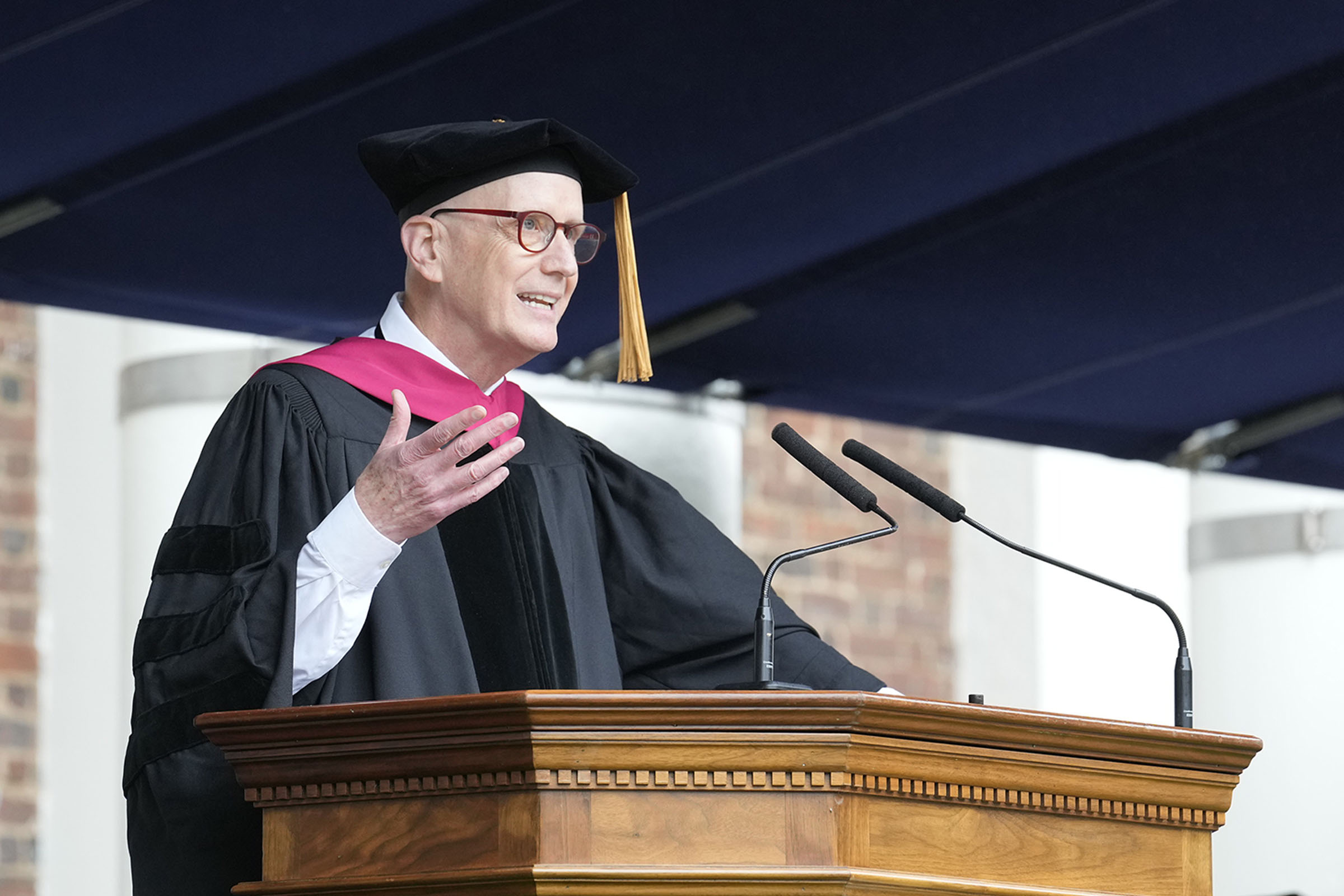
Willingham advised the students how to pursue lifelong learning, even when their futures get busy with careers and families. (Photo by Dan Addison, University Communications)
Parents communicate values in many other ways. For example, every family has myths that are retold through generations. What are the themes of these stories that we think are worthy of repetition? Every family has heroes. Who did your parents speak of with respect? What characteristics made someone worth emulating?
Graduates, it may seem odd that I’m talking to you about family values now, when many or most of you don’t have families of your own. But if you’re not a family already, you’re about to become a nascent family of one. You will be the author of the values in this family. It’s up to you to create an independent life that you feel is in accord with those values.
The fourth preschool principle for lifelong learning is to make small, but intentional choices that show you hold learning as a family value. That means it’s not an isolated activity that you try to make time for; as a value, it’s shot through your daily life, and touches everything – decisions you make, your relationships and how you see the world.
One of the things that makes the University of Virginia so special is that you’re surrounded by faculty, administration, staff and fellow students for whom learning is a treasured value. That shared value makes for a very supportive environment. It’s easy to be a learner here. Lifelong learning, outside of the University, will prove more challenging. But I am confident that your experiences here have provided the foundation you need to continue learning for a lifetime.
But think about that tomorrow. Today, celebrate your achievements with your loved ones, and accept my warmest congratulations and best wishes for the future, Class of 2024.

